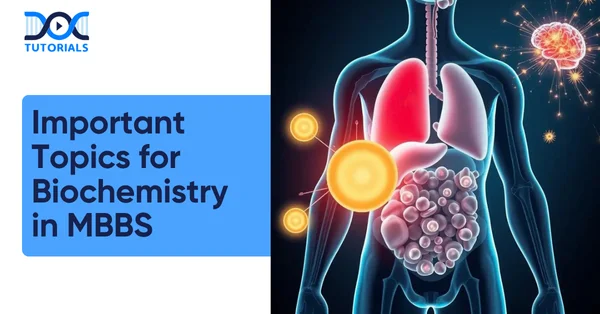Important Topics for Biochemistry in MBBS

Biochemistry is a fundamental first-year MBBS subject – conceptual, practical, and advantageous in exams. It divides molecular science and clinical medicine to enable students to learn the biochemical basis of health and disease.
In the case of NEET PG, metabolism, enzymes, and molecular biology are all high-yield topics with recurrent questions on the subject. A good command of these subjects improves your NEET PG result and enhances your knowledge in physiology and pathology.
This article covers the most important biochemistry topics to include under the MBBS course, the relevance of the subject in examinations, and the best study tips on how to score better and build on the basics.
Keep reading!
Importance of Biochemistry for NEET-PG Preparation
The basis of most clinical concepts of medicine is biochemistry, which relates molecular processes to disease and physiology. In the case of a first-year MBBS student, learning biochemistry subjects is essential for both university examinations and competitive tests such as NEET-PG. Actually, biochemistry is considered a high-yield subject.
As per the latest examination, approximately 10-15 NEET-PG questions will be from biochemistry. Therefore, excellent conceptual clarity at this stage can enhance MBBS marks as well as the rank in the postgraduate exam. The competency-based MBBS programme suggested by the National Medical Commission (NMC) also emphasises the combined study of biochemistry principles with physiology and pathology.
Key Biochemistry Topics for MBBS and NEET PG
In the MBBS first year, biochemistry covers a wide range of topics. According to exam patterns and the official syllabus, students are supposed to be particularly concerned with the following high-yield areas:
| Topic Category | High-Yield Topics |
| Carbohydrate Metabolism | Glycolysis, Gluconeogenesis, TCA cycle, HMP shunt, Glycogen (synthesis/lysis), Fructose/Galactose, Diabetes |
| Lipid Metabolism | Synthesis of Fatty Acid β-oxidation/synthesis, Cholesterol (synthesis & regulation), Ketone bodies, Lipoproteins (HDL/LDL/VLDL), Dyslipidemias |
| Protein/Amino Acids | Amino Acid catabolism, Urea Cycle, Essential AA, Porphyrin (heme) synthesis, Haemoglobin structure/function, Collagen |
| Enzymology & Bioenergetics | Enzyme kinetics/regulation, Coenzymes (NADH, FADH₂), ATP production, Respiratory chain (ETC) |
| Genetics/Molecular Biology | DNA replication, RNA transcription, Genetic code, Mutations, Recombinant DNA (PCR, cloning) |
| Vitamins & Minerals | Vitamin B-complex, A, D, E, K functions; Coenzymes; Deficiency diseases; Iron, Calcium, Phosphorus, Trace elements |
| Clinical Tests/Disorders | Liver function tests, Kidney function tests, Plasma proteins, Electrolytes, Acid-base, Diabetes, Metabolic disorders |
- Cellular & Biomolecular Foundations
Cell structure and organelles, fluid/electrolyte balance, pH and buffer system, and chemistry of biomolecules (carbohydrates, proteins, lipids, and nucleic acids). As an example, learn about cell membrane structure, basic cell chemistry, amino acid and carbohydrate structures, and protein concentration in blood.
- Carbohydrate Chemistry & Metabolism
Complicated pathways such as glycolysis, gluconeogenesis, the citric acid (TCA) cycle, and the pentose phosphate pathway (HMP shunt) are mandatory. Be conversant with the requirements of the regulation, important enzymes (e.g., hexokinase, PFK, and PDH), and clinical associations (e.g., diabetes, hereditary fructose intolerance, etc.).
Know about the metabolism of glycogen (synthesis and breakdown) and glycogen storage disorders (such as von Gierke’s disease and McArdle’s disease).
- Lipid Chemistry & Metabolism
Learn in detail about the structure of fatty acids, saturation and unsaturation, and other important processes, such as β-oxidation (dissociation of fatty acids) and fatty acid synthesis. Prioritise topics related to control of cholesterol (production and maintenance) and ketones (production and oxidation).
Lipoprotein structure and metabolism (chylomicrons, VLDL, LDL, HDL): dyslipoproteinemias (familial hyperlipidemias). Non-alcoholic fatty liver and metabolic syndrome are some of the clinical links.
- Protein & Amino Acid Metabolism
Pay attention to the amino acid usage, the urea cycle (disposing of nitrogen), and the major biosynthetic pathways. Study the essential amino acids and their breakdown products. Learn basic amino acid metabolism and inherited disorders such as phenylketonuria (PKU) and alkaptonuria.
Know the levels of protein structure (primary to quaternary), protein folding, and key proteins (e.g., collagen, haemoglobin) – it is important to know the oxyhaemoglobin dissociation curve and CO₂ transport.
- Enzymology and Bioenergetics
Understand enzyme categorisations, kinetics (Km, Vmax, Lineweaver-Burk plots), and regulation (feedback inhibition, allosteric enzymes). Knowledge about coenzymes (NAD, FAD, and CoA) and the production of ATP (chemiosmotic theory) is essential.
In this regard, the most important topics are the types of enzyme inhibition (competitive and noncompetitive) and the example of marker enzymes (e.g., ALT/AST in liver injury).
- Genetics & Molecular Biology
This part links biochemistry and genetics. Notable topics include DNA/RNA structure, replication, transcription, translation, and gene regulation (e.g., the lac operon). Be familiar with the characteristic features of the genetic code (wobble hypothesis, degeneracy), forms of mutations, and DNA repair.
Automated methods of DNA recombination (PCR, restriction enzymes, and blotting) should also be covered, as they frequently come up in NEET PG questions.
- Vitamins & Minerals
Memorise water-soluble (B-complex, vitamin C) and fat-soluble (A, D, E, K) vitamins: the application as coenzymes, syndromes of deficiency, and sources. Additionally, trace elements such as iron (heme synthesis, anaemia), zinc (enzymes, wound healing), and calcium/phosphate metabolism (including the role of vitamin D and parathyroid hormone) are to be learned as well.
As an example, the expression of vitamin D activation and calcium homeostasis processes is often examined.
- Clinical Biochemistry Tests and Disorders
Know the common examples of basic biochemical parameters and interpretation, e.g., liver (bilirubin, enzymes), kidney (urea, creatinine), blood sugar (insulin/glucagon effects), and acid-base (metabolic acidosis/alkalosis).
Topics associated with pathology, such as diabetes mellitus, inborn errors of metabolism, and immunology (antibodies and antigen-antibody interactions), are significant as well.
These are the topics which are suited to standard biochemistry texts and exam syllabi.
Taking Effective Notes for MBBS Biochemistry and Memorising
Note-taking plays an important role in biochemistry. To avoid copying, summarise in your own words and concentrate on concepts. Here’s what you can do:
- Write concise subheadings and bullet points on each topic. Organise the information with the help of diagrams, flowcharts, and tables.
- An example would be to draw out metabolic pathways manually (such as glycolysis or TCA), and then repeat this process again and again.
It was found that drawing pathways out in memory (coloured in where needed) improved your recall of the steps and regulators. Here, flowcharts may also be used to create connections between hormones and their biochemical activity (e.g., insulin/glucagon action on metabolism).
- Mnemonic devices and flashcards are of great assistance. Make flashcards about names and functions of vitamins, e.g., to remember the essential amino acids, one could keep in mind the phrase PVT TIM HALL (Phenylalanine, Valine, Threonine, Tryptophan, Isoleucine, Methionine, Histidine, Arginine (semi-essential), and Lysine).
Similarly, remember coenzyme names (all end in –ase for enzymes, –ate for coenzymes) and common suffix clues (e.g., “kinase” means adding phosphate) to decode terms.
The following are some additional practical tips that one can follow:
- Record common laboratory test values in tabular form (e.g., normal sugar levels, ABG values) and note any important disease markers (HbA1c, enzyme elevations).
- Put the summary tables (of buffer systems, etc.) in a notebook where they can be revised quickly.
There are lists of bullets or mind maps that can be abbreviated and include only the necessary points to be studied in a hurry at the end of the chapter. All these techniques, flowcharts, flashcards, mnemonics, etc. They are based on active recall and have been demonstrated to have a beneficial effect on retention in biochemistry.
Planning Your Study Strategy for MBBS Biochemistry
Developing the syllabus in advance would mean full coverage. Here’s what you can do:
- Begin at the Bottom
Master the fundamentals of the elementary concepts (the chemical structure of biomolecules, pH, and cellular organisation) before proceeding. Also, as professionals suggest, we should understand the structures of molecules and how they perform their functions, and then memorise them. Biochemistry builds on itself (e.g., glycolysis ➔ TCA cycle ➔ ETC), so a good foundation will help you avoid confusion in the future.
- Split the Curriculum Down into Manageable Pieces
Focus on one major metabolic pathway/molecule at a time. Underline your study plan with the lecture schedules and with the MC curriculum (in many universities, biochemistry consists of two papers: Paper I on basics and biomolecules, and Paper II on metabolism, nutrition, and clinical biochem). Spend more time on harder areas, such as complex high-yield pathways and regions.
- Frequently, Combine What You Learn with Physiology and Pathology
When you are learning about hepatic metabolism, match it with the GI physiology and hepatic pathology. This interdisciplinary style is an indication of the way NMC’s integrated teaching functions, and it is also similar to the NEET-PG question style (where biochemistry facts are frequently connected to clinical situations).
- Revision is Crucial
Combine daily reviews (again, reading notes, self-testing) with periodic revisions (weekly and monthly summaries). When revising, attempt to sketch crucial pathways or processes out to see how well you are able to remember.
Do practice problems at the end of each topic – MCQs or short-answer problems should be used to find out the weak areas. Last but not least, take regular breaks and set specific objectives.
High-Yield MBBS Biochemistry Topics by Category
The following is a list of summaries of the specific topics covered by MBBS exams and NEET-PG. This can be added as a checklist in your study plan:
- Metabolic Pathways
- Glycolysis (enzymes, regulators, defects)
- Gluconeogenesis (substrates, control)
- TCA cycle (steps, amphibolic functions)
- Pentose phosphate pathway (phases, NADPH role)
- Amino Acid Metabolism
- Urea cycle (enzymes, diseases)
- Phenylalanine/tyrosine (PKU, tyrosinosis)
- Methionine/homocysteine (trans-sulfuration, remethylation)
- Branch-chain amino acids (Maple syrup urine disease)
- Porphyrin/heme synthesis breakdown (porphyria, bilirubin metabolism)
- Lipid Metabolism
- Fatty acid β-oxidation (mitochondrial vs peroxisomal)
- Fatty acid production (location, enzymes, regulation)
- Cholesterol production (HMG-CoA reductase, regulation)
- Ketogenesis (when and how ketones are produced)
- Omega-3/6 fatty acids
- Lipid-storage diseases (Tay-Sachs, Gaucher)
- Genetics & Molecular
- DNA replication (enzymes, proofreading)
- Transcription (polymerases, promoters)
- Translation (ribosomes, tRNAs, codon-anticodon pairing)
- Gene regulation (lac operon, trp operon)
- Mutations (types, examples: sickle cell)
- Genetic tools (PCR, restriction digestion, electrophoresis)
- Vitamins & Cofactors
- Detailed understanding of individual vitamins:
- e.g., B₁ (thiamine) – TPP cofactor, deficiency (Beriberi, Wernicke)
- B₃ (niacin) – NAD/NADP, deficiency (pellagra)
- Folic acid and B₁₂ as to DNA genealogies
- Vitamin D and calcium as to homeostasis
- Other coenzymes, such as CoA, biotin, and lipoic acid, are also to be noted.
- Enzymes
- Enzyme mechanisms of action, activity (temperature, pH)-affinity, and kinetics (Michaelis-Menten, Lineweaver-Burk analysis).
- Be familiar with examples of allosteric enzymes (e.g., PFK-1, ATCase) and zymogens (pancreatic enzymes).
- Clinical Biochemistry
- Procedures and guidelines of usual laboratory examination (colourimetric glucose tests, ELISA of hormones)
- Analysis of findings (e.g. high alkaline phosphatase in cholestasis)
- BUN/creatinine ratios in renal failure
- Other significant facts, such as blood buffer systems (bicarbonate, haemoglobin buffer) and normal values (serum bilirubin range, blood pH), are to be memorised
Additional pointers to remember:
- Concentrate on the explanations of why things occur (e.g., why does glucagon raise blood sugar?), as opposed to rote lists.
- These prep guides recommend a particular focus on the integration of metabolism and the effect of hormones.
- Make sure to review last year’s solved questions to spot any recurring topics (for instance, pyruvate dehydrogenase complex deficiencies or Pentose phosphate defects often appear).
Recommended Books and Study Resources for MBBS Biochemistry
Choosing the right study materials can greatly enhance preparation. Key textbooks for Indian MBBS students include:
- Concise Medical Biochemistry by Satyanarayana & Chakrapani – an Indian standard text that aligns well with the MBBS curriculum and is written in exam-friendly language.
- Textbook of Biochemistry for Medical Students by D.M. Vasudevan – widely used, updated for clinical relevance (newer editions have reduced extraneous content and focus on exam points)
- Lippincott’s Illustrated Reviews: Biochemistry (South Asia Edition) – popular for its clear explanations and diagrams, especially useful for visual learners.
- Harper’s Illustrated Biochemistry – a comprehensive reference (use selectively for complex topics, since it is detailed and lengthy)
- Self-Assessment & Review of Biochemistry by Rebecca James – an MCQ and review book highly recommended for NEET-PG practice, with chapter-wise questions and explanations
Here are some additional pointers to consider:
- Many students also refer to other Indian books, such as those by J.E. Levitt (Concise Biochemistry) and S. S. Jadhav (Biomolecular Student: Biochemistry).
- There are also books written explicitly for MBBS (Biotechnology) that are usually briefer, like Biochemistry by J. Arun and Parimita.
- Select one primary textbook, and complement it with another one regarding complex subjects. Say, you read Satyanarayana and consult Lippincott as a reference to revise images to utilise in a hurry, and Harper as a check for your doubts.
- Online resources are invaluable – lecture videos (by authors like Dr Shanmugapriya, Arti Nailwal, etc.), interactive apps, and notes.
- Take advantage of question banks and mock tests. Regularly solve previous years’ university and NEET-PG question papers.
- Books such as Review of Biochemistry (Nicholas and Lapp, or similar), or books of past NEET-PG MCQs, may be utilised.
- There are also lots of toppers using apps (Biochemistry QBank by Arun Sharma, Immunology-based series, etc.) and practising under time constraints. Mimicking the exams through a mock test will highlight areas of weakness and create confidence.
Study Plan and Syllabus Completion Strategy for MBBS Biochemistry
A smart strategy is to integrate biochemistry with your ongoing curriculum and revision schedule. Here are some actionable steps:
- Create a Timetable: Allocate specific hours each day/week for biochemistry. Start with fundamental chapters (e.g., biomolecule chemistry) and progress to metabolism and molecular biology.
- Link Subjects: When learning endocrinology in physiology, review the biochemistry of hormones and second messengers simultaneously. This integrates learning and follows the NMC competency model.
- Divide & Conquer: Break topics into small goals. Tackle difficult topics first or with more study time.
- Regular Revision: Implement spaced repetition. For instance, revisit a topic one day, one week, and one month after first learning it. Use mini-quizzes to ensure retention.
- Batch Practice: After finishing a major topic (e.g., carbohydrate metabolism), do a set of 20-30 MCQs on that topic, then review mistakes immediately.
- Peer Discussion: Form a study group to quiz each other or teach a topic. Explaining concepts aloud helps you retain them and reveals gaps.
- Past Papers: At the end of each month or every few chapters, solve past university and NEET-PG questions on those chapters. This pinpoints high-yield areas and question styles.
Consistently following this plan will make your preparation “rock-solid”. Remember, understanding the why behind processes (e.g., why insulin lowers blood sugar) is more useful than memorising isolated facts. Techniques like concept mapping (linking glucose homeostasis steps) can also help.
FAQs about Important Topics for Biochemistry in MBBS
- Which biochemistry topics are most asked in NEET PG?
Important NEET PG concepts are enzyme kinetics, vitamin deficiencies, metabolic cycles (Krebs, glycolysis, urea), DNA replication and DNA repair, molecular biology, Heme metabolism, and also inborn errors such as phenylketonuria.
- How many biochemistry questions come in NEET PG?
There are approximately 10-15 questions each year, primarily based on metabolism, enzymes, vitamins, and molecular genetics.
- What are the clinical uses of biochemistry in MBBS?
Biochemistry explains diseases such as diabetes, jaundice, and kidney diseases and aids in the interpretation of laboratory tests such as the levels of glucose, urea, and hormones.
- How does biochemistry relate to physiology and pathology?
It links molecular processes to body functions and diseases — for instance, ATP production is associated with muscle activity, and enzyme defects lead to metabolic diseases.
- What practical experiments are done by MBBS students in biochemistry?
Students may need to test samples of glucose, proteins, urea, cholesterol, and ketone bodies, carry out enzyme assays and colourimetric estimations, and engage in diagnostic learning.
Conclusion
Biochemistry may seem vast, but it’s crucial for MBBS and NEET PG success, as it links molecular science with clinical practice. Mastering pathways, enzymes, and metabolic disorders strengthens concepts and diagnostic skills.
Focus on high-yield topics with DocTutorials, revise regularly, and use smart methods like diagrams, flowcharts, and mnemonics. Success comes from strategy, not hours spent.
MBBS Biochemistry simplified by DocTutorials!
Latest Blogs
-

INI CET Exam Pattern 2025: A Complete Guide with Subject-Wise Weightage
The Institute of National Importance Combined Entrance Test (INI CET) is your key to entering some of the most prestigious…
-

NEET PG Registration 2025: An Essential Guide For Exam Prep
The NEET PG registration, which is conducted online, is a crucial step in the exam process. Filling out the NEET…
-

NEET PG Syllabus 2026: A Must-Have Complete Guide for Exam Success
The NEET PG Syllabus acts as one of the foundation stones for aspiring postgraduate medical students like you who are…




